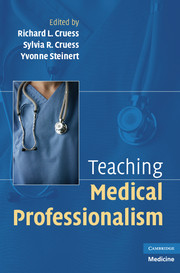Book contents
- Frontmatter
- Contents
- List of Contributors
- Foreword by William M. Sullivan
- Introduction
- PART ONE WHAT IS TO BE TAUGHT
- PART TWO THEORY
- PART THREE PRINCIPLES
- 4 Principles for Designing a Program for the Teaching and Learning of Professionalism at the Undergraduate Level
- 5 Resident Formation – A Journey to Authenticity: Designing a Residency Program That Educes Professionalism
- 6 Supporting Teaching and Learning of Professionalism – Changing the Educational Environment and Students' “Navigational Skills”
- 7 Assessment and Remediation in Programs of Teaching Professionalism
- 8 Developing Professionalism across the Generations
- 9 Faculty Development for Teaching and Learning Professionalism
- 10 The Relationship between Teaching Professionalism and Licensing and Accrediting Bodies
- 11 Educating the Public about Professionalism: From Rhetoric to Reality
- PART FOUR PRACTICE: CASE STUDIES IN TEACHING PROFESSIONALISM ACROSS THE CONTINUUM
- APPENDIX A Definitions of Professionalism
- APPENDIX B Core Attributes of Professionalism
- APPENDIX C The Teaching of Professionalism: Vignettes for Discussion
- APPENDIX D A Matrix for “Matching” Teaching Methods to Attributes
- APPENDIX E Sample Grid for Use with Discussion of Vignettes
- APPENDIX F Sample Questions to Guide Discussion about the Social Contract: Small-Group Leaders' Guide with Suggested Responses
- APPENDIX G Professionalism Program for Residents: Suggested Outline for Small Group Facilitators
- APPENDIX H Sample Evaluation Form for Residents' Half-Day Program on Professionalism
- Index
- References
11 - Educating the Public about Professionalism: From Rhetoric to Reality
Published online by Cambridge University Press: 01 September 2009
- Frontmatter
- Contents
- List of Contributors
- Foreword by William M. Sullivan
- Introduction
- PART ONE WHAT IS TO BE TAUGHT
- PART TWO THEORY
- PART THREE PRINCIPLES
- 4 Principles for Designing a Program for the Teaching and Learning of Professionalism at the Undergraduate Level
- 5 Resident Formation – A Journey to Authenticity: Designing a Residency Program That Educes Professionalism
- 6 Supporting Teaching and Learning of Professionalism – Changing the Educational Environment and Students' “Navigational Skills”
- 7 Assessment and Remediation in Programs of Teaching Professionalism
- 8 Developing Professionalism across the Generations
- 9 Faculty Development for Teaching and Learning Professionalism
- 10 The Relationship between Teaching Professionalism and Licensing and Accrediting Bodies
- 11 Educating the Public about Professionalism: From Rhetoric to Reality
- PART FOUR PRACTICE: CASE STUDIES IN TEACHING PROFESSIONALISM ACROSS THE CONTINUUM
- APPENDIX A Definitions of Professionalism
- APPENDIX B Core Attributes of Professionalism
- APPENDIX C The Teaching of Professionalism: Vignettes for Discussion
- APPENDIX D A Matrix for “Matching” Teaching Methods to Attributes
- APPENDIX E Sample Grid for Use with Discussion of Vignettes
- APPENDIX F Sample Questions to Guide Discussion about the Social Contract: Small-Group Leaders' Guide with Suggested Responses
- APPENDIX G Professionalism Program for Residents: Suggested Outline for Small Group Facilitators
- APPENDIX H Sample Evaluation Form for Residents' Half-Day Program on Professionalism
- Index
- References
Summary
Professionalism has become something of a contemporary preoccupation. The public's persistent worry about professionals, often somewhat misleadingly described as concern about professional “ethics,” is in fact a suspicion that professionals have broken faith with the public. Frequently, especially in popular journalism, the accusation is that professionals have abandoned the public; they have become self-protective and aloof from the significance of what they do.
INTRODUCTION: FRAMING THE ISSUE
This book is devoted to the teaching and learning of medical professionalism. As is true of virtually all discussions of medical professionalism, its principal focus is on what individual physicians and the professional bodies composing organized medicine can and must do to sustain medical professionalism. So too was the focus of the physician Charter, which has been hailed appropriately as a milestone in the profession's efforts to fulfill its contract with society. The Charter called on physicians to affirm three principles underlying professionalism – the primacy of patient interest, patient autonomy, and social justice – and laid out ten categories of responsibilities for physicians to discharge in actualizing those principles.
Clearly, the need for physicians, both individually and collectively, to understand the nature of professionalism, to exemplify the attributes and behaviors required to manifest professionalism, and to appreciate the contemporary threats to professionalism's continued survival cannot be overestimated. But its critical importance notwithstanding, such inwardly directed emphasis leaves unexamined the public's stake in medical professionalism and the role the public must play to ensure that it continues to obtain the benefits of professionalism.
- Type
- Chapter
- Information
- Teaching Medical Professionalism , pp. 200 - 208Publisher: Cambridge University PressPrint publication year: 2008



